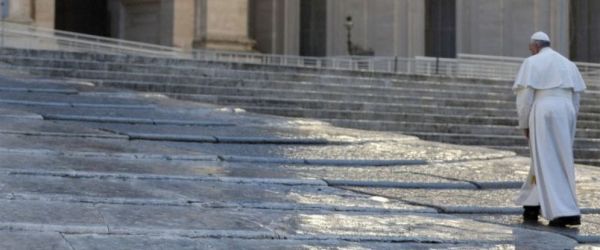This is touching. Jesus washing the feet of his disciples. Peter did not understand anything, he refused. But Jesus explained. Jesus - God - did this! And He Himself explains to the disciples: 'Do you understand what I have done for you? You call me the Master and the Lord, and rightly so, for I am. If therefore I, the Lord and Master, have washed your feet, you too must wash one another's feet. For I have given you an example, that you also should do as I have done' (Jn 13:12-15). It is the example of the Lord: He is the most important and washes the feet, because among us the one who is the highest must be at the service of others. And that's a symbol, that's a sign, isn't it? Washing feet is: 'I am at your service'. And we too, among ourselves, it is not that we must wash each other's feet every day, but what does this mean? That we must help one another. Sometimes I have been angry with one, with another ... but ... let it be, let it be, and if he asks you for a favour, do it. To help one another: this is what Jesus teaches us and this is what I do, and I do it from my heart, because it is my duty. As a priest and as a bishop I must be at your service. But it is a duty that comes from my heart: I love it. I love this and I love doing it because the Lord has taught me so. But you too, help us: always help us. Each other. And so, by helping each other, we will do each other good. Now we are going to do this ceremony of washing our feet and we think, each of us think: "Am I really willing, am I willing to serve, to help the other?" Let us only think this. And we think that this sign is a caress from Jesus, which Jesus does, because Jesus came precisely for this: to serve, to help us.
QUESTION FROM A YOUNG MAN:
Thank you Father for coming today. But I want to know one thing: why did you come here today to Casal del Marmo? Enough, just that.
ANSWER FROM THE POPE:
It's a feeling that came from the heart; I felt that. Where are those who will perhaps help me more to be humble, to be a servant as a bishop must be. And I thought, I asked: "Where are those who would like a visit?" And they told me 'Casal del Marmo, maybe'. And when they told me that, I came here. But from the heart came that alone. The things of the heart have no explanation, they only come. Thank you, eh!
FINAL SALUTES
Now I take my leave. Thank you so much for your welcome. Pray for me and do not let hope be stolen from you. Always ahead! Thank you very much!
[Pope Francis, homily during the Lord's Supper, "Casal del Marmo" Penal Institute for Minors in Rome, 28 March 2013]












